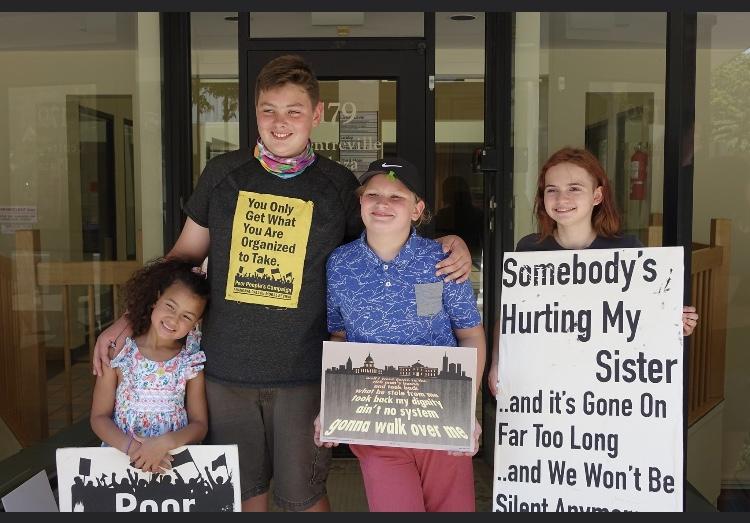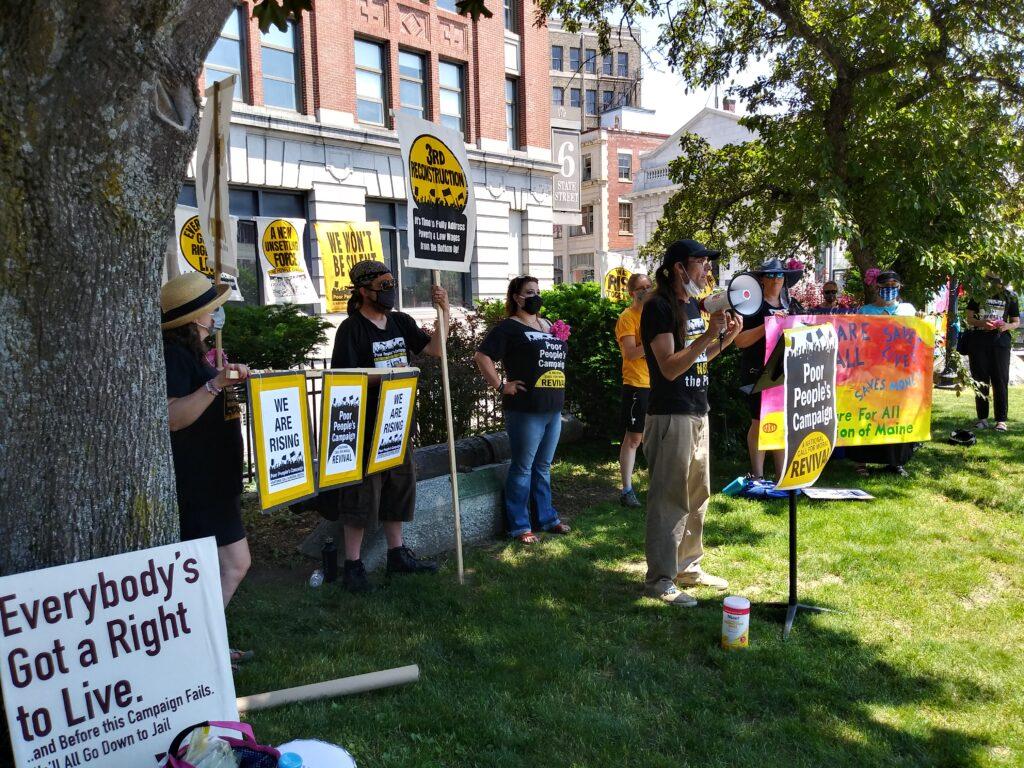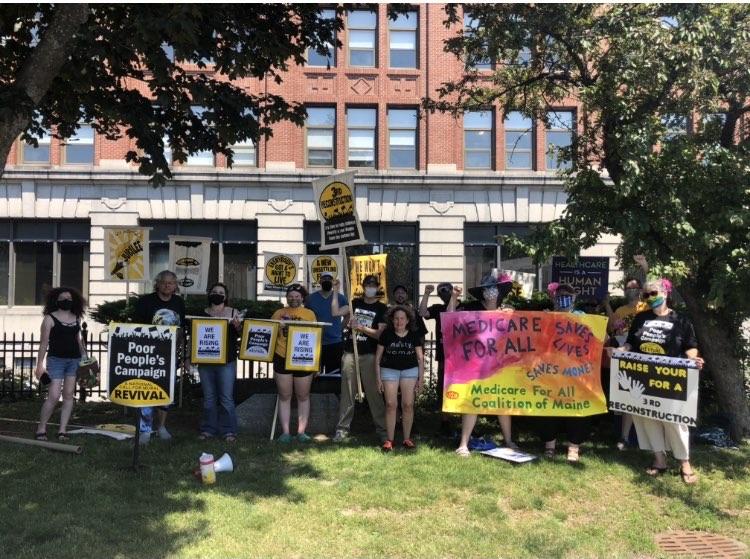
“…When I am asked to say the pledge of allegiance I run into a dilemma. Every time I get to the part ‘indivisible, with liberty and Justice for all,’ I pause and think, ‘really?’ This is not what I see when I look at the country I live in…”
—Rafaella, 11 yrs old
We stared in disbelief when the police arrived as we were packing up from our witness for the 3rd Reconstruction in front of US Rep. Jared Golden’s office in Lewiston, ME. Because it was 95 degrees, we had tucked into the shaded entryway of the office building for our press conference. As our children shared their personal experiences of homelessness, food insecurity, transphobia, and more, the property manager had asked us to move. It was a legitimate request — we hadn’t been sure where the line was between public and private property and it wasn’t our goal to get in the way of our community members trying to access the building. We scooted back onto public property for the rest of our witness.
“Being hungry has been a part of my life for almost as long as I can remember. I remember having to wait in line for food with other hungry families. Sometimes the food we were given would only last a couple of days or would already be rotten. This made me feel ashamed of myself but I hadn’t actually done anything wrong. My Mom is a hard worker and always spent every day working and every dollar on the things we needed. I could tell it wasn’t enough even as a little kid.
I don’t think it is right for any kid to feel that way, especially over something as important as food…Please do what you know is right and embrace the Third Reconstruction resolution to fully address poverty and low wages from the bottom UP!”
—Corbyn, 14 yrs old
Rep. Golden had recently welcomed a new baby into the world and we had decided to appeal to his paternal instincts, our kids sharing their stories and demanding that we do better by all the nation’s children. But as we were gathering our things to leave, 2 police officers showed up. The property manager had called them in, falsely telling them that we had refused to move. Then two more officers showed up. Four police officers for four children, three mothers, and one other adult standing on public property. What was the property manager so afraid of?
“I was born homeless, my mom and brother lived in a car before I was born and then we moved from one small apartment to the next because the rent was always being raised and even though my Mom works every day she still couldn’t afford the cost. We aren’t homeless now and I’m grateful to my Mom for never letting us feel poor. …Jared Golden, I feel that poor and low income people are forgotten in your decision making. I want you to know that we are powerful and important.”
—Kingsley, 10 yrs old
Of course, we knew the answer to that question. Is there anything more terrifying to those committed to maintaining the status quo than a group of children who already recognize the broken systems around them and use their voices to demand change?
Meanwhile, PPC organizers holding a simultaneous press conference at Rep. Golden’s Bangor office ran into the same wall.
The day had started joyfully, tucked into the parking garage because of the heat, eating ice cream and building the framing for the beautiful banners we received for the event. We set up in the park next to Rep. Golden’s office. The scene was vibrant: sunshine, the deep green of trees and bushes contrasting with the yellow, black, and white PPC messages of solidarity and power, and our theomusicologists leading us in the music that bound us together and reminded us of the struggles of those who came before.

As our testifiers shared their stories and we read excerpts from the 3rd Reconstruction Resolution, a passerby wandered over. Moved by the truths she heard, she picked flowers and gave one to each of us.
Her impulsive gesture of care took on a sense of bitter irony later, when we recognized how easily we had made friends in the streets while being ignored by those more comfortable in the halls of power.
Ahead of our actions, a PPC leader from central Maine had called Rep. Golden’s office to ask him to support the work of the resolution. A staff member told her that only 28 Representatives had signed on so far.
As if that was a reasonable response.
As if of course our representatives determined whether or not to ensure their constituents had food and shelter based on how many other representatives cared enough to take action.
One of our northern leaders named the learning of that moment: a campaign rooted in fundamental morality forces all of us to acknowledge the justifications we tell ourselves as we subvert our own morals to keep toeing the line. But those sudden moments of uncomfortable awareness are also possible moments of transformation.
And then, when another PPC leader reached back out to the office after the public witnesses, she was told that Rep. Golden would not support the resolution because of the 10% cut to military spending. “While disappointing it’s not surprising,” wrote another Mainer. “He’s a veteran. It’s almost assured he’s going to be pro-military.”
Indeed.
But we know it is possible to be pro-military and recognize the astonishing bloat of the military budget and the impact it is having on vulnerable citizens. Just as we know that it is possible to be pro-service member and pro-veteran and still recognize the deep immorality of our imperialist actions overseas, the violent consequences of excess military equipment being sold to local police forces who wield it in service of systemic racism and white supremacy, and the devastating impact our military has on the environment. Which is why we are committed here in Maine to pushing Rep. Golden out of the reflexive defense of military spending and into reflective awareness of the larger context of that spending.
We ended the day weighed down by the ugly truths our witnesses brought to the surface about power and those who will use it to protect the status quo at all costs.
Weighed down but not ground down.
In fact, when we checked on the kids to see how they were feeling after their encounter with the police, they were fired up. They understood that someone had tried to silence them because their words were dangerous to the Way It Is; that their stories tore down the walls of shame and judgement that divide us and invited us to build beloved community together; that their courage reminded all of us how much power we would have if we reclaimed it and refused to give it up again.
“Somebody’s hurting our people, and we won’t be silent anymore.”
